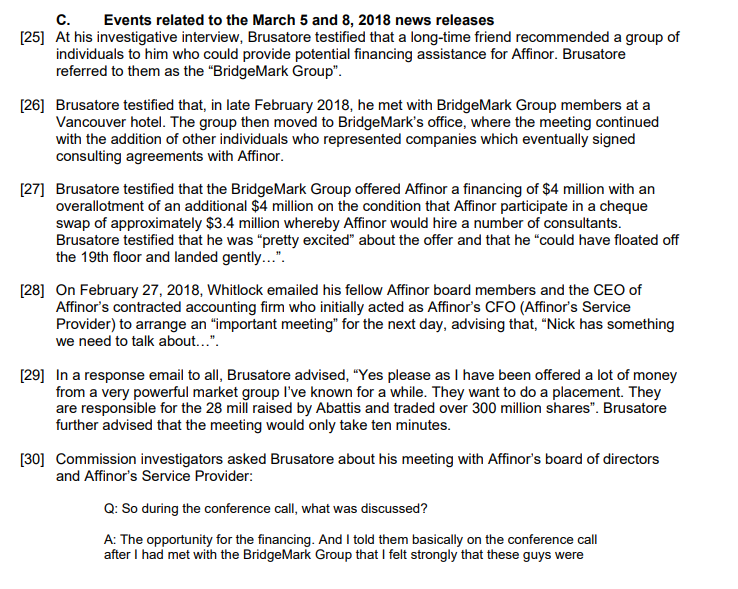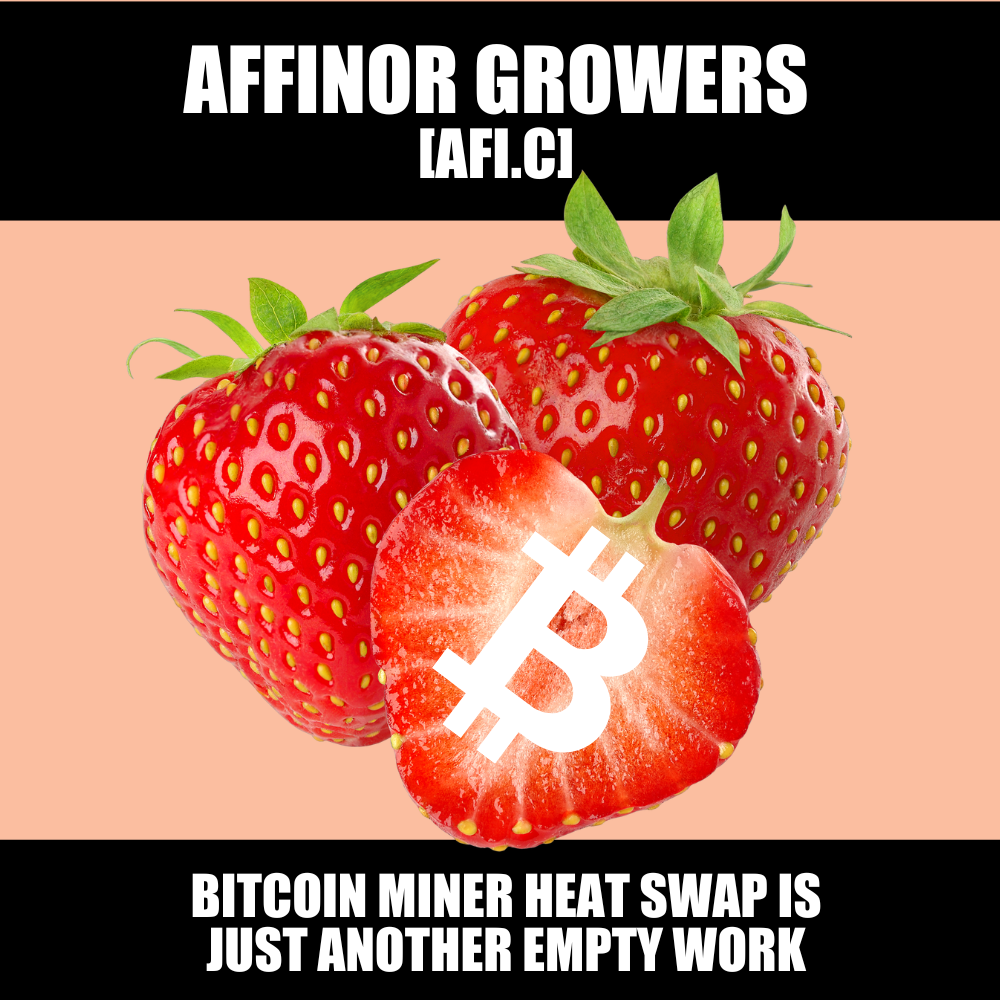Long time readers (and I mean loooonnng time readers) will recall the tale of Affinor Growers Inc. (AFI.C), a former weed company from the green rush days whose story went from:
‘We’re going to grow weed in vertical indoor systems, send us all your monies’
To: ‘That didn’t work because weed is tall – who knew – so we’re going to grow super strawberries instead and sell them for a fortune to five-star Asian hotels’
And then to: ‘We haven’t managed to sell a punnet of strawberries but we’re SO FUCKING CLOSE I SWEAR’
..for every year of the last ten years. At this point, based on sales, I appear to have grown more strawberries on my back porch than Affinor has in their greenhouse.
Well Affinor is back in the news, this time with a headline-grabbing partnership: a deal with Blockchain Labrador Corp. (AKA: BlockLab) to explore using waste heat from Bitcoin mining to warm their Abbotsford BC strawberry greenhouse.
The companies say they’ve signed a strategic advisory agreement. The goal: see if BlockLab’s “Hestia Bitcoin Mining Furnace” can be deployed alongside Affinor’s vertical farming system, powered by solar panels and Tesla Powerwalls. In return, Affinor is issuing BlockLab 300,000 stock options at five cents a share. No money is changing hands.
CEO Nick Brusatore called the potential setup “a showcase” of how two unlikely sectors—crypto and agriculture—can combine forces to reduce carbon footprints and boost efficiency.
Bruiser Brusatore has a long history of ‘showcase’ deals, many of them personally enriching himself through licensing his own IP back to the pubco he controls, and precisou few of them ever becoming profitable for Affinor.
So a $15,000 deal (if Blocklab ever bothers to execute the options) would hardly be called a groundbreaking agreement for either party.
what is *seems* like is two companies agreeing to put out a news release that might get them a few column inches for a day and maybe some trading volume.
But hey, I’ve pissed all over Brusatore’s rep for years now, so many I’m just being a cynic. What’s the reality of this deal?
The Heat Problem: More complicated than it sounds
Bitcoin mining produces plenty of heat—that’s a fact. The idea of redirecting that heat into agriculture isn’t new, and it’s not without merit. Data centers in Scandinavia already pipe waste heat into homes and greenhouses.
But heat from ASIC miners is dry, uneven, and hard to control, and that’s where this concept gets thorny—especially for strawberries.
Strawberries are humidity-loving, temperature-sensitive plants. Ideal growing conditions hover between 18°C and 24°C with 60–80% relative humidity. Miner exhaust, on the other hand, comes out hot and arid, often over 50°C at source and bone-dry. Without an engineered heat exchange system and a proper humidity control loop, this kind of heat could stress the plants, dry out the air, and do more harm than good.
And what happens when there’s too much heat?
Does it just get pumped out into the Abbotsford environment, or will there be a need to cool things down at great cost of energy and water.. or, worse, will they sometimes need to turn off the Bitcoin miners?
So far, the press release makes no mention of humidity management, airflow zoning, or climate integration—key challenges for anyone thinking about repurposing industrial-grade heat into delicate crop environments.
That’s not to say BlockLab can’t do any of that, but they don’t mention any of it in their news release. Just heat.
The Deal: More fluff than fire?
Here’s the rub: this “deal” doesn’t read like a real deployment. It’s an advisory agreement, not a pilot project. No capital is being committed. No equipment is being shipped. And BlockLab’s compensation—300,000 stock options at $0.05—suggests this is more of a press release arrangement than a shovel-ready project.
There’s no defined budget, no timeline, no technical scope, no plan.
Affinor calls it a “showcase.” But so far, it’s only a showcase of intention.
Affinor’s long history of trying—and failing—to make strawberries work
If this story sounds familiar, it’s because Affinor’s been here before.
For over a decade, the company has touted vertical growing systems, greenhouse strawberries, automation, and ag-tech innovation. In filings as recent as April 2024 (see SEDAR doc #5904107), the company disclosed:
-
No commercial revenues from crop sales
-
Accumulated losses exceeding $40 million
-
Net working capital of just $8,260
Their 2024 MD&A notes ongoing efforts to secure financing, finalize engineering for their system, and complete greenhouse integration in Abbotsford. But despite all the announcements, Affinor has never commercially scaled strawberry production.
This isn’t the first flashy concept they’ve tied to their core story—it’s just the latest one, with a crypto twist.
Verdict: Clever optics, but still vapor
Using waste heat from Bitcoin mining to grow crops makes for great copy. But Affinor’s announcement isn’t a build, it’s a conversation starter—with some cheap stock options attached. And while BlockLab may have real tech, the absence of integration detail makes this feel more like an idea Affinor wishes it could fund rather than something they’re actually deploying.
The problem isn’t the idea. The problem is history—and a company that’s still chasing strawberries that remain, even after a decade, out of reach.
Oh – and the class action lawsuit.
And the many unfinished deals.
And the Bridgemark Scandal.

— Chris Parry
FULL DISCLOSURE: No commercial connections. Personal connections, on the other hand: I was once in the boardroom while Brusatore pitched a client company a deal. I left early and told the CEO what was being proposed wasn’t legal. The deal went ahead regardless, without my involvement going forward.


Leave a Reply